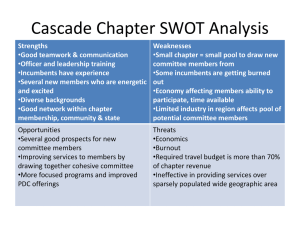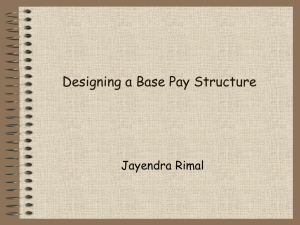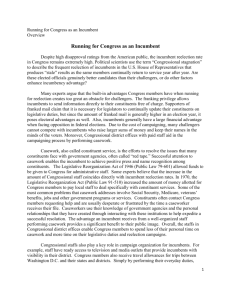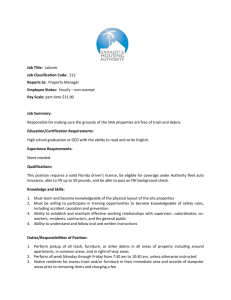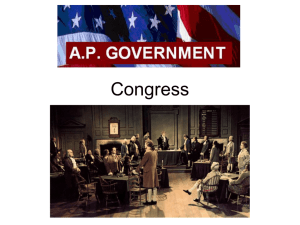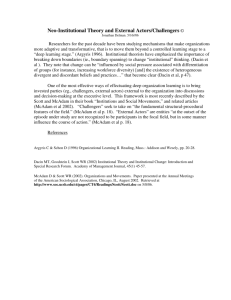Crossborder Governance in the Paso del Norte Region
advertisement
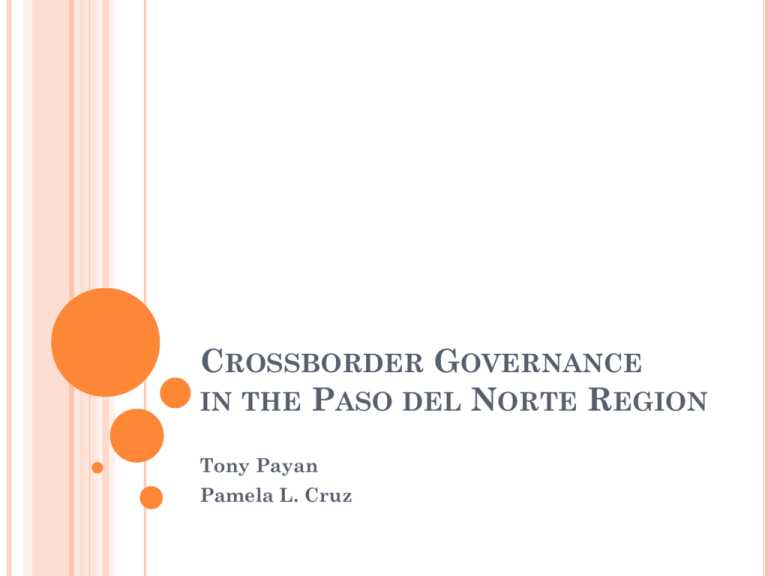
CROSSBORDER GOVERNANCE IN THE PASO DEL NORTE REGION Tony Payan Pamela L. Cruz STRATEGIC ACTION FIELD THEORY Fligstein and McAdam Strategic Action Fields Theory (SAF) Strategic action fields Incumbents, challengers, and governance units Social skills The broader field environment Exogenous shocks, field ruptures, and the onset of contention Episodes of contention Settlement Theoretical complementation TAR (Sassen) Four Fields (Brunet-Jailly) Cultural construction and context (Martinez) Gradual evolution (Payan) METHODOLOGY Interviews Survey 70+ interviews 300 Surveys Event Attendance and Observation Two dozen events Ideal and only situation to observe incumbents Historical analysis CASE STUDY The border as a strategic action field Double complexity Vertical (Multiple governmental levels) Horizontal (Across the borderline) Multiplicity of actors (including mutually exclusive) Political Security Economic Voiceless Strapped with a reified structure (the nation-state) Theoretical complementation: TAR (Sassen) Is it one field of action or interaction between two fields of action? Pam: Its own hybrid field? INADEQUACY OF SAF THEORETICAL FRAMEWORK State A State B Strategic Action Field FINDINGS ON INCUMBENTS Incumbents: Security Agents Admit no or few challenges Incumbents are largely silent (Silence speaks) They would not open a conversation for fear of a challenge Engage local efforts only to gather intelligence information When asked, they use discourse effectively They show up at meetings but do not actively participate or engage in dialogue or encourage a flow of information Always show up in uniform (often with guns) Meaning makers / Rhetorical Entrepreneurs / Reality Constructors Exploitation of crises for long range action Gradualism between crises Never adjust back Skillful at building material interests of the vested bureaucracies Construction of political economies and industrial coalition building Inflexible application of the rules CBP is recognized as the main problem by economic actors Border Patrol is recognized as a main problem for civil society INCUMBENTS SKILLS Highly skillful Rhetorical Construction Meaning Makers Norm creators Coalition Builders Interest consolidation Take advantage of crisis Employ gradualism effectively FINDINGS ON CHALLENGERS Challengers (majority of interviewees) Self-perception as outsiders Nostalgic discourse Justify the Status Quo Insecurity, violence, undocumented migration, corruption, etc. Do not speak to the definition of security or securitization processes They speak to obstacles and negotiate around them Speak of risk-avoidance as a necessary condition for change Cite political structural differences as reasons for lack of coordination Cite ineffective/dead border programs as important FINDINGS ON CHALLENGERS’ SKILLS Challengers There is some understanding of the tasks ahead but no clear leadership or strategies Construction of separate narratives on each side of the border Regional identity but not effective coalition building Crossborder competition and economic division of labor Political power is not viewed as the channel for institutional change Low levels of coalition building Do not view the voiceless as an ally Negotiation at the margins has been the strategy Christmas wait times FINDINGS ON ACTORS AS A WHOLE Not all challengers are equal Political Actors Economic actors Borderplex alliance/Desarrollo Económico de Juárez Self-blame (Mexico) Civil Society Present reasons for the situation/justify the incumbents—perhaps due to political-electoral vulnerability (anti-politics of leadership) Subject to the vicissitudes of the political and electoral cycle Subject to the daily exercise of power Authoritarian demobilization Low levels of collective action Civil society with broader public interests is demobilized through effective threats, sanctions, and the construction of fear Quiet protests Programs divide potential challengers along socioeconomic lines Grant privileges with occasional reminders CT-PAT; DCL; etc. Bear on the less privileged / The Voiceless FINDINGS ON ACTORS Federal vs. Local: Incumbents vs. Challengers Exceptions: Congressman O’Rourke Straddles different spaces Civil society and government Local and federal Economic interests and public interests No equivalent on the Mexican side Dearth of institutional entrepreneurs THE ACTORS Economic Political Security Voiceless KEY ISSUES Identity Common identity is evident in the responses Necessary but not sufficient condition Skills Low skills are reinforcing overtime Challengers are not unified Structural TAR advantages on security agents of the State Historical evolution: The weight of history Part of the field environment FINDINGS Field Environment The field environment structure is explained by the TAR framework Securitized Low value for crossborder interaction (low priority) Economic challengers have not succeeded in changing the narrative Single dominant group (internal dynamics? A black box) The field environment is composed of irrefutable logic that even challengers fail to dispute: drugs, undocumented migration, corruption in Mexico, terrorism, national security, etc. Stable with gradual change, through time and external shocks Nestled within the larger national discourse FINDINGS Shocks have favored the incumbents but do not appear important in the stability of the field Gradual approaches have also favored incumbents Path dependent development (Red/Black Ball Game) Southbound inspections Technology has also favored incumbents Deployment of increasingly militarized technology Technology placates (shorter wait times) but reinforces the hegemony of the incumbents—it is used on their terms Identity is key, but not sufficient to create solidarity to mount a challenge Economic actors are qualified challengers because they do not have the public interest in mind Political actors are constrained by the political/electoral cycles FINDINGS ON GOVERNANCE UNITS Governance Units Security-based rules and processes Economic, environmental, political, and social processes prop up the security narrative GUs set up by the incumbents ensure routine stability and order in the field, determine the dynamics among players, guard interests, fend off challenges, serve as information clearing houses, guarantee compliance and conformity, certify participants, and legitimize actions Incumbents use daily routines effectively to reinforce dominance Continual complaints about frequency and types of checks and use of discretionary power Degree of uncertainty even under compliance Example of the Mexican truckers FINDINGS ON EPISODES OF CONTENTION External Shocks are perceived by actors as threats or opportunities Episodes of Contention Follow Crises Effective episodes of contention for consolidation but not for construction of the field environment Timothy Dunn’s book on the Border Patrol Only temporary concessions External shocks have not provided opportunities for challengers (coherence and skills are also required) NAFTA FINDINGS Local political actors share the frustration but do not directly challenge the incumbents They negotiate at the margins DCL, Wait time at local cost, etc. Institutional structures across fields do not possess the “coupling” mechanisms Inability to institutionalize cooperation Except a few: IBWC (Medina) INSTITUTIONALIZATION LEVELS High levels of institutionalization based on TAR in the larger field environment but not across the mutually exclusive fields Low levels of institutionalization across Low innovation in institutionalization Low skills among challengers Low solidarity among challengers Local vs. Federal Governance Limited dispersion of authority at the borderline
